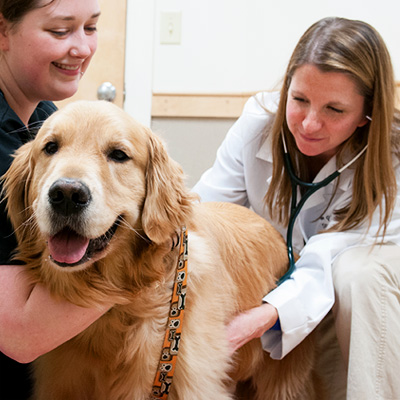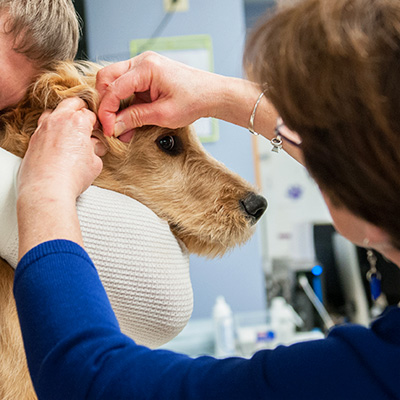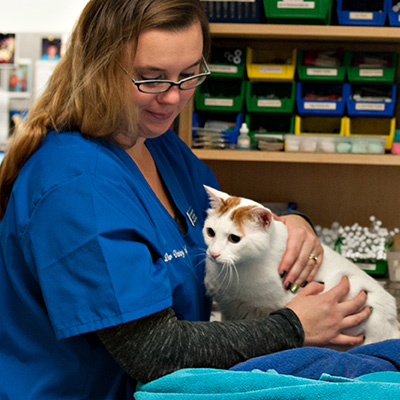Keep Your Pet Healthy & Happy at Dover Veterinary Hospital
Give Your Pet the Care it Needs at Dover Veterinary Hospital
At Dover Veterinary Hospital, we believe that prevention is the key to your pet's long term health and a step towards minimizing the lifetime cost of care. This means routine wellness exams, vaccinations, regular lab work, deworming and fecal checks, as well as medications to prevent heartworm, fleas and ticks.

The majority of your pet's tests can be done during regular wellness exams. These examinations are similar to the yearly physical you receive from your doctor. It gives your veterinarian a chance to assess your pet's overall health, discuss any changes they see, educate and update you on advancements in veterinary care and for you to discuss any concerns or questions you may have.
During your pet’s wellness appointment, your veterinarian will:
- Examine the heart and lungs
- Check the teeth and oral cavity
- Assess vision, eyes, and ears
- Palpate the lymph nodes and abdomen
- Check the skin for lumps, bumps and parasites
- Palpate the joints and muscles
A complete physical also includes a heartworm test and fecal exam for parasites and a full blood profile. Not only can a blood chemistry panel and blood count identify the presence of underlying disease processes, but these tests help create a baseline should your pet become ill between regular examinations. Additionally, blood work is necessary if your veterinarian recommends a dental cleaning, removal of a skin mass or any other procedure that requires anesthesia.
Parasite Control

Parasites can be real pests. Both external (fleas, ticks) and internal (heartworm, hookworm, roundworm) parasites can cause problems for both your pet and your family. Prevention is the best approach to eliminating these pests. Please ask a staff member at Dover Veterinary Hospital for the best way to prevent parasite problems in your pet.
Regular fecal checks and deworming are the best way to prevent parasitic disease and the transmission of intestinal parasites from pets to people. It also prevents the transmission of parasite eggs, which contaminate lawns or any place a pet defecates.
We also recommend complete blood testing annually for all pets.
Heartworm, Fleas and Ticks
Since heartworm, fleas and ticks are always present in the environment, we recommend that your pet receive medication for these pests. We sell a variety of preventive medications and would be happy to help you determine which is best for your companion.
In all, these services offer the best means to protect your pet's health and well-being through prevention and early detection of disease.
Vaccines
Dover Veterinary Hospital strongly recommends that you keep your pets current on their vaccines. Vaccinations are not only safe and effective; they are an important and fundamental piece of your pet's preventive healthcare plan. Diseases that were once relatively common and fatal to pets are now easily preventable due to advances in veterinary immunology.

There are also vaccines—such as for Rabies and other zoonotic diseases—that help protect your family from very dangerous and difficult to treat illnesses. Additionally, with each passing year, veterinary science is improving on existent vaccines as well as increasing our ability to prevent an even wider array of contagious diseases.
At Dover Veterinary Hospital, our vaccination protocol follows guidelines established by the American Animal Hospital Association Vaccination Task Force. We consider the age and lifestyle of your pet—as well as the diseases he or she are most likely to be exposed to in the New Hampshire and Southern Maine areas—when recommending a vaccine protocol. During your kitten's or puppy's first year of life, we also schedule vaccines so that we do not put too much strain on developing immune systems.
Vaccine Titers
During the last decade there has been discussion over the amount and number of vaccines that are necessary for a companion animal to remain protected from disease. Many pet parents don't like the idea of over-vaccinating their pets and believe it may lead to health problems due to an over-stimulated immune system. These health issues can include diseases such as allergies, infections, cancer and immune mediated diseases.
Additionally, there are studies showing that many vaccines last longer than the one to three-year time periods that are generally recommended for revaccination. In response, some veterinarians are adjusting their vaccination protocols and determining the frequency of vaccination based upon each individual patient.
The primary method of determining if a pet is in need of a booster is through vaccine titers (pronounced tie-ters). Titers are blood tests that quantify the antibodies to a particular pathogen (i.e. a virus such as parvovirus and distemper). This information helps to determine the immune response should your pet become exposed to a pathogen and is used to help determine whether or not revaccination is required.
Benefits of Checking Titers:
- May reduce the frequency of vaccination
- Reduces the risk of allergies, infections, cancer and immune mediated diseases
- Reduces the risk of an anaphylactic reaction associated with vaccination
Dover Veterinary Hospital offers titers as an alternative to vaccines for adult dogs for distemper and parvovirus and for adult cats for panleukopenia and rhinotracheitis. Your veterinarian will be happy to answer any questions you may have during your pet’s next appointment, and help you decide whether vaccines titers are the best choice for your pet.

